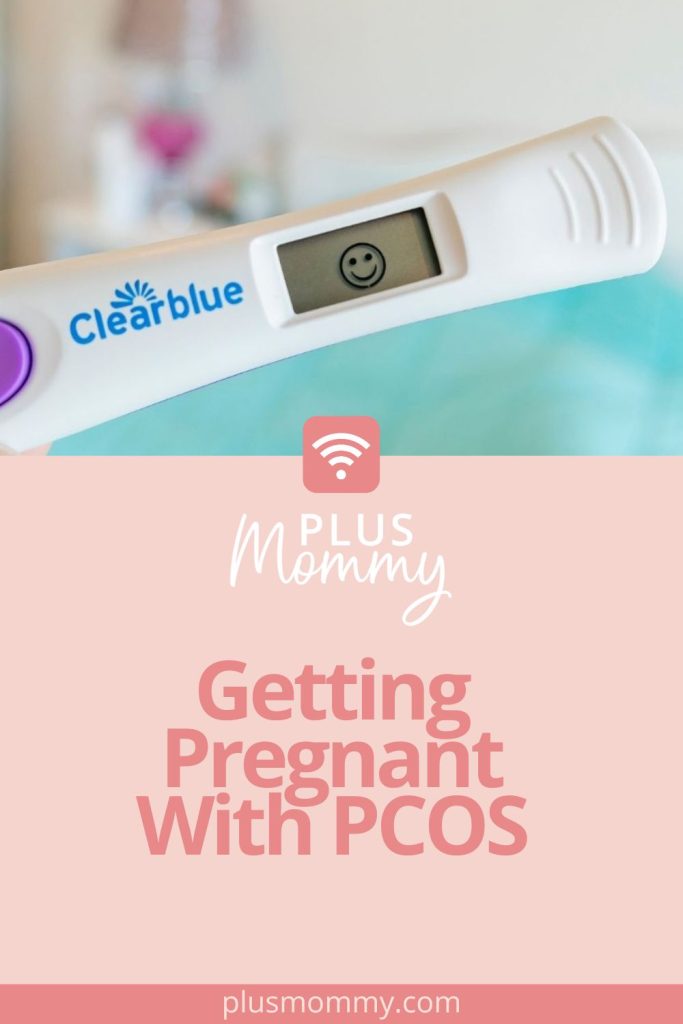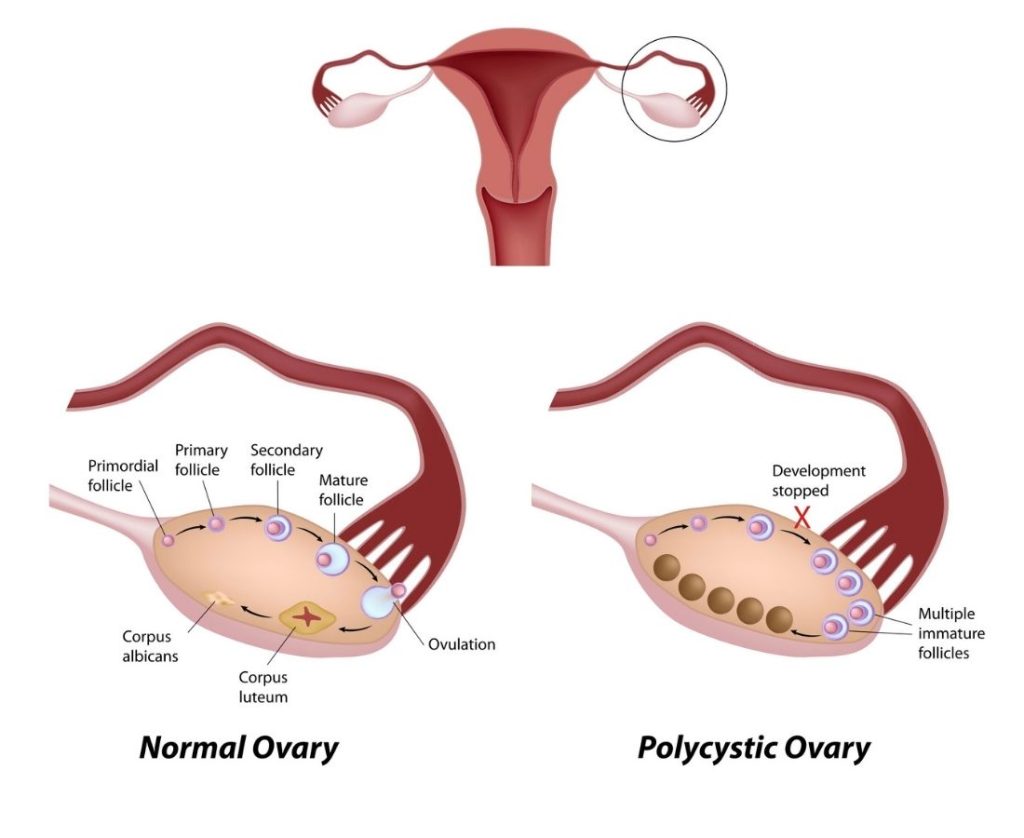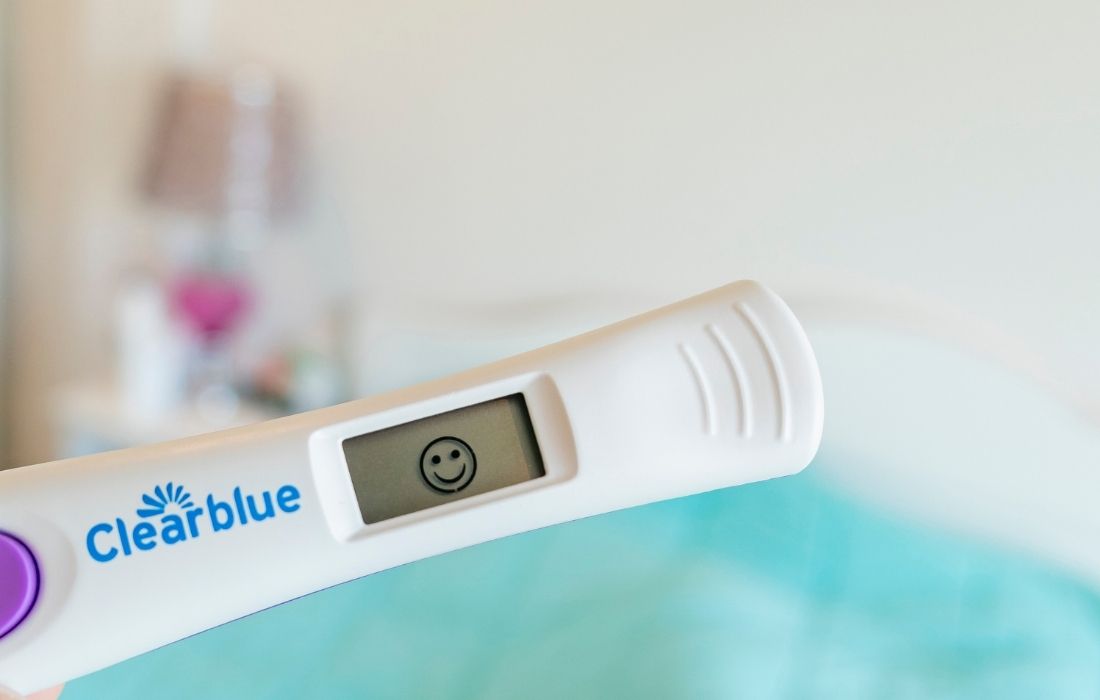Getting Pregnant With PCOS – Helpful Tips You Need To Know
Getting pregnant with PCOS is possible for many, but it can also be challenging.
Angela Grassi, the founder of PCOS Nutrition Center, is a registered dietician and an internationally known nutrition and health expert on Polycystic Ovarian Syndrome (PCOS). She takes a Health At Every Size® approach to her work. Angela shares helpful information for getting pregnant with PCOS and much more!
Disclosure: Plus Size Birth is a participant in the Amazon Services LLC Associates Program, an affiliate advertising program. As an Amazon Associate, I earn from qualifying purchases. Read more about these links in my disclosure policy.

What is PCOS?
Before discussing pregnancy and PCOS, we need to establish what PCOS is and the symptoms people experience.
Polycystic Ovarian Syndrome (PCOS) is a hormonal disorder. It’s one of the most common causes of infertility for people with uteruses.
PCOS causes problems with fertility due to hormonal imbalances and higher testosterone levels.
As Angela shares, “I always tell my female patients that all women have testosterone just like all men have estrogen. It’s just your ovaries are pumping out more testosterone than you need. And that causes havoc with your other female sex hormones that control your menstrual cycle.”
Often people with PCOS either don’t get their period for months and sometimes years, or they get really heavy periods that are prolonged.
PCOS is also an endocrine disorder because there are many metabolic aspects, for example, insulin resistance.
Those with PCOS also have higher rates of type two diabetes, fatty liver, and high cholesterol.
What are the symptoms of PCOS?
Acne is a common symptom of PCOS due to higher testosterone levels.
Extra hair growth occurs, especially in the central part of the body, like your lip area, chin, between the breasts, around your belly button, and in the thighs. This hair might be coarse or more excessive than usual.
Some people experience a receding hairline and bald spots along with body hair growth.
Weight gain is a common feature of PCOS, and it is difficult for people to lose weight.
It’s important to note that weight loss does not cure PCOS.
Along with all of the physical symptoms, there are the emotional ones.
“There are so many dermatological symptoms, and it really affects your body image and your self-esteem.”
How to get diagnosed with PCOS?
A PCOS diagnosis occurs if someone has at least two of the following criteria below.
- Fewer than eight periods in a year, or no menstruation.
- Signs of high testosterone like hair loss, extra hair growth, acne, and blood tests that show that they have elevated testosterone.
- A transvaginal ultrasound showing the presence of follicles surrounding the ovaries. Or follicles that never fully develop or get released for fertilization.

How To Get Pregnant With PCOS
As we shared at the beginning, getting pregnant with PCOS is possible, as many people have shared their stories.
How can you improve fertility with PCOS?
Focusing on lifestyle changes is the starting place when managing PCOS.
There’s an underlying inflammation and higher levels of insulin. So it’s essential to include antioxidant-rich foods like fruits, vegetables, and whole grains in your diet.
To help boost your fertility, omega-three fats like avocados and seeds and nuts, fish, and nut butter, are great options.
Beyond nutrition, exercise can be beneficial for fertility and during pregnancy. For example, even a ten-minute walk after you eat dinner can bring down glucose and insulin levels and decrease the risk for gestational diabetes during pregnancy.
When people make these changes, we see an increase in energy. People can get their cycles more regulated as testosterone and insulin levels start to decrease.
We also know that sleep is crucial for fertility. Unfortunately, a very high number of people with PCOS have sleep apnea. Consider getting a sleep study if you have any concerns.
How to approach “lifestyle changes” with nutrition from a Health At Every Size® approach?
Use the Health at Every Size® (HAES) principles, tap into resources like The PCOS Workbook, and connect with a HAES® informed nutritionist.

Most importantly, tuning into your body and your needs. For example, you can start by noticing what foods help energize your body and leave you feeling satisfied and what food makes you sluggish.
What supplements support fertility when you have PCOS?
Always talk to your healthcare provider before taking a new supplement.
Sometimes you can’t get everything you need through food, and often people are deficient in certain nutrients.
Vitamin D
Vitamin D deficiencies are common, especially during the winter months. Incredibly, vitamin D is also a hormone, and receptors have been found in eggs. So, there’s a clear correlation between low vitamin D levels and fertility struggles.
Inositol
Inositol is found in food and is like a B vitamin, but not exactly. It helps improve fertility for people with PCOS by working to restore hormone imbalances and insulin levels.
Fish Oil with DHA
Fish oil is important during pregnancy for the baby’s brain development. It’s also great for inflammation and can lower triglycerides.
Resveratrol
Resveratrol is a potent antioxidant with anti-inflammatory properties. In addition, it can help improve insulin levels.
What to do following a PCOS diagnosis?
Start by getting a full blood panel to know your current levels as you begin to make the lifestyle changes discussed above.
For example, your thyroid can impact fertility, and it’s essential to know if you’re prediabetic or diabetic before trying to get pregnant.
Pay attention to body changes when you’re ovulating, like seeing a spike in your temperature or changes in your cervical mucus.
You can monitor your basal body temperature by taking your temperature immediately when you wake up. Or use a convenient fertility tracker like Tempdrop that offers a larger armband.
“Just knowing more about PCOS and knowing what’s going on with your body is so important.”
Learn even more about getting pregnant with PCOS, and how PCOS impacts pregnancy, postpartum, and nursing during the podcast episode below!
Recording & Show Notes: Plus Mommy Podcast Episode 171
Transcript happily provided upon request.
Resources Mentioned On The Show:
- Plus Size Pregnancy Weekly Breakdown
- Learn more about PCOS Nutrition Center and The PCOS Workbook.
- Connect with Angela via PCOS Nutrition on Instagram and Twitter.
- Plus Mommy Podcast episodes featuring PCOS stories.

Angela Grassi, MS, RDN, LDN is a nationally recognized, award-winning registered dietitian nutritionist and the founder of the PCOS Nutrition Center where for over 20 years she has been providing evidence-based nutrition information and coaching to people with PCOS. Angela is the author of several books on PCOS including The PCOS Workbook: Your Guide to Complete Physical and Emotional Health and The PCOS Nutrition Center Cookbook.







